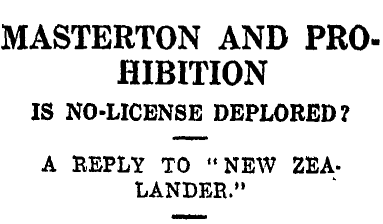-
Vera commented on Funeral of Tupua Tamasese Lealofi III
-
Peter MacDonald commented on First World War sniper rifle
-
Peter MacDonald commented on First World War sniper rifle
-
admin commented on Levin war memorial
-
Dennis C Cole commented on Levin war memorial
The no-license debate in Masterton

Headline from the Evening Post 21 November 1914.
‘A successful experiment’ or ‘a farce’?
A stranger reading about Masterton under no-license could be forgiven some confusion about whether the town was prospering. Accounts of the town’s experiences without licenses diverged wildly. Local campaigner Jabez Bridges claimed in 1911 that:
Two happy, prosperous years have passed since the vote of the people took effect, and the shutters were put up on the licensed bar. During those two years our town has grown cleaner and our people more sober. Our homes too are happier and our children are better cared for since No-License came into operation, and all agree that ‘tis well ‘twas won.
A correspondent to Wellington’s Evening Post on 14 November 1914, who called themselves ‘New Zealander’, wrote:
To the face of all the evidence, no fair-minded person can claim that No-License in Masterton has benefited the people of that town. It has not progressed. Its population has not increased […] the morals and religious status of a population cannot be improved by such conditions […]. Masterton is, as a sample of No-License in operation, an example to be strenuously avoided.
In response, Charles Daniell wrote a week later:
As a resident of Masterton for thirty-five years, and carrying on a business paying more than £10,000 a year in wages, and as President of the Masterton Chamber of Commerce, I should be familiar with the conditions obtaining here.
There is no doubt that there are men in Masterton whose love of alcohol is strong; here, as elsewhere, these men strive to satisfy this craving. There are others, younger men, who because of the legal restrictions on the sale, revel in the excitement of blockade running. Then there are men who see in these conditions opportunity for making profit by trading on the weaknesses of one, or the fancied smartness of the other. These men are fairly well known, and their characters are such that no ordinary trader would trust them in the smallest business transaction. In order to check their operations, the police occasionally bring these "droppers" before the Court, when I fear that the natural love of fairplay, generally so admirable a characteristic of our legal administration, is so extended by our benevolent Magistrate as to give equal credence to the statements of the offenders as is given to the people's representatives, the police officers. The natural effect is to discourage the police and encourage the "droppers," who, in turn, laugh at the amiable Magistrate and sneer at a baffled policeman.
In spite of this, I submit that there is no reason to justify the statements you make in the article published by arrangement. I have, during the past few months, visited most of the towns of this island, and in none did I see conditions superior (few as good) as obtain in Masterton today.
Taking your summary in order, allow me to say that Masterton is to-day more prosperous than at any time in its history. As evidence take the response to the appeals for war and war relief funds. Has any community done better?
There is still an unsatisfied demand for houses; while as to the quality of the homes being built, we challenge any district in the Dominion. Let any doubter come and see.
You say we have not retained the native-born. It is true that we can point to successful youths and men throughout the Dominion and the Commonwealth, virile and manly youths, who claim Masterton as their "home".
You say many people desire to leave the district. Well, we in turn would be pleased to say "Good-Bye" to such. We want the companionship of workers, not the criminal described.
You say that we suffer social outrages. I agree that it is not a Paradise. We have mean and selfish men, but they find it more difficult than it once was to practise their arts. It is now possible for women to pass along our footpaths without annoyance; it was not always so.
I set out to protest against the unworthy slur you, an outsider, cast on a community that has dared to say that it does not and will not license certain men to trade on the acknowledged weakness of some of its citizens.
I ask you in fair play to publish this. - I am, etc.,
CHARLES E. DANIELL
Alexander Turnbull Library
Reference: Eph-C-ALCOHOL-Prohibition-1911-01
Further information and copies of this image may be obtained from the Library through its 'Timeframes'
website, http://timeframes.natlib.govt.nz
Permission of the Alexander Turnbull Library, National Library of New Zealand, Te Puna Matauranga o
Aotearoa, must be obtained before any re-use of this image
Evening Post 21 Nov 1914 - see this on PapersPast.

 Delicious
Delicious StumbleUpon
StumbleUpon Facebook
Facebook Twitter
Twitter Google
Google







Community contributions